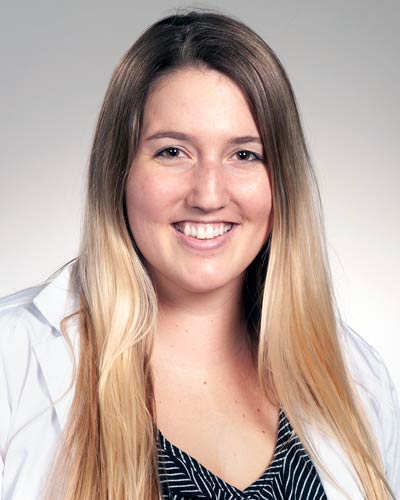Student Research Spotlight
Hannah Groff (DO '19)
February 18, 2019 Hannah Groff’s (DO ’19) love of research began during her years as an undergrad at
Franklin & Marshall College, but truly solidified once she came to PCOM and began
her medical career. Since enrolling in medical school, she has participated in several research studies with the Rothman Orthopedic Institute
in Philadelphia, Pennsylvania. She says the experience has helped her contribute to
a field she finds fascinating, and hopes to one day mentor others the way her mentors
have helped her.
Hannah Groff’s (DO ’19) love of research began during her years as an undergrad at
Franklin & Marshall College, but truly solidified once she came to PCOM and began
her medical career. Since enrolling in medical school, she has participated in several research studies with the Rothman Orthopedic Institute
in Philadelphia, Pennsylvania. She says the experience has helped her contribute to
a field she finds fascinating, and hopes to one day mentor others the way her mentors
have helped her.
What did you study?
I work as an orthopedic researcher at Rothman. We have been fortunate to work on several
studies looking at various topics including causes of in-hospital mortality after
hip fractures; organism profile in periprosthetic joint infection; and femoracetabular
impingement (FAI).
One of the projects began with a conversation I had with a research fellow at Rothman.
I was reading about venous thromboembolism (VTE) prophylaxis after total joint arthroplasty
and I noticed some of the projects were funded by big pharmacological companies. We
wondered whether there was a bias in these studies and wanted to further explore this
topic. I wrote a research proposal for the study and we designed a systematic review
looking at funded versus non-funded studies assessing VTE prophylaxis after total
joint arthroplasty. We hypothesized that these funded studies were taking healthier
patients and thus had better results.
After including 57 studies in our systematic review, we found that they did not have
any difference in patient demographics. However, industry-funded studies did report
less pulmonary embolism (PE) and less 90-day mortality compared to non-funded studies.
This was the first study in orthopedic literature showing a reported outcome bias
in funded studies. We presented this as a poster presentation at the American Academy
of Orthopaedic Surgeons and our findings were published this past year in the Journal of Arthroplasty.
What prompted you to pursue research?
During my undergraduate career at Franklin & Marshall College, I was involved in several
research projects including examining the personalities of betta fish and observing
fern gametophytes. They were very interesting studies, but not exactly related to
my interest in medicine.
I began my medical career at PCOM and knew I was interested in orthopedics, so the
summer between my first and second year of medical school I reached out to Javad Parvizi,
MD at the Rothman Institute to get involved in one of his projects. I loved the idea
that these studies could have an impact on patient care and physician decision-making
in the medical community. One study as a summer research intern turned into several
studies as I stayed on the research team throughout medical school.
What experience do you have conducting research?
I was very fortunate to participate in research with Dr. Parvizi; we’ve presented
research at multiple conferences and have published manuscripts in a variety of orthopedic
journals. This experience has confirmed my passion for orthopedics and sparked my
interest in clinical research.
What were your responsibilities in your research project?
I’ve had the opportunity to be very involved in several research projects at Rothman,
from proposal to final manuscript. I was an active participant in data collection,
statistical analysis and writing the papers. It was a great opportunity to hone my
research skills and take on a leadership role by being first author on these studies.
What is the broader impact of your research?
Through these projects, I’m able to identify areas in the field of orthopedics in
need of improvement, and find research-based solutions. And, I am incredibly grateful
for the orthopedic mentors that I have had in my life. They showed me not only the
exciting field of orthopedics, but also taught me how to become a compassionate and
determined physician. I envision myself mentoring other medical students while working
on research projects and continuing to improve this incredible field.
You May Also Like:
About Philadelphia College of Osteopathic Medicine
Established in 1899, Philadelphia College of Osteopathic Medicine (PCOM) has trained
thousands of highly competent, caring physicians, health practitioners and behavioral
scientists who practice a “whole person” approach to care—treating people, not just
symptoms. PCOM, a private, not-for-profit accredited institution of higher education,
operates three campuses (PCOM, PCOM Georgia and PCOM South Georgia) and offers doctoral degrees in clinical psychology, educational psychology, osteopathic
medicine, pharmacy, physical therapy, and school psychology. The college also offers
graduate degrees in applied behavior analysis, applied positive psychology, biomedical
sciences, forensic medicine, medical laboratory science, mental health counseling,
physician assistant studies, and school psychology. PCOM students learn the importance
of health promotion, research, education and service to the community. Through its
community-based Healthcare Centers, PCOM provides care to medically underserved populations.
For more information, visit pcom.edu or call 215-871-6100.
Contact Us
For general media inquiries, please contact the Office of Marketing and Communications
at 215-871-6300 or communications@pcom.edu. Visit our media relations page to view contact information for public relations personnel.
Connect with PCOM
 Hannah Groff’s (DO ’19) love of research began during her years as an undergrad at
Franklin & Marshall College, but truly solidified once she came to PCOM and began
her medical career. Since enrolling in
Hannah Groff’s (DO ’19) love of research began during her years as an undergrad at
Franklin & Marshall College, but truly solidified once she came to PCOM and began
her medical career. Since enrolling in 